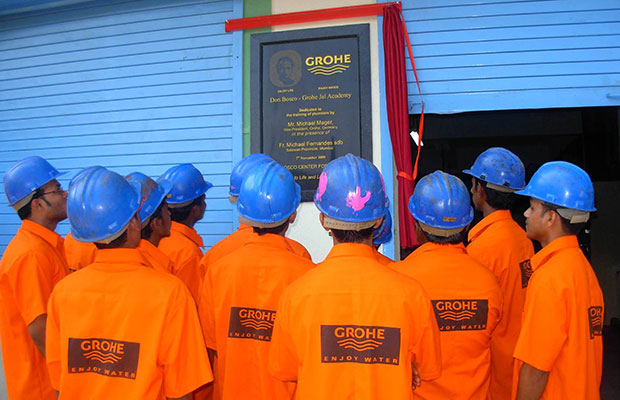
Vision for Sustainable Water – and Futures
On March 22, Salesian Missions joined the international community in celebrating World Water Day — an annual event that focuses attention on the importance of safe, clean water; calls for equitable and just access to water as a basic human right; and advocates for the sustainable management of fresh water resources. In recognition of the impact that clean water — or its lack — makes on the issues we care about, Salesian missionaries have prioritized water projects in every community in every country in which they serve.
“Water is essential for life,” says Father Mark Hyde, director of Salesian Missions. “Yet every 21 seconds, a child dies from a water-related illness.”
“Not having clean water is directly linked to poverty and poor well-being,” he continues. “It is therefore critical that we create sustainable models for delivering clean water to communities that need it — or the health, food security and future of its people are at serious risk.”
In addition to the many completed and ongoing projects to drill wells, construct water towers and install hydroelectric facilities in remote and impoverished communities, Salesian missionaries have invested considerable resources into developing and sharing such sustainable models.
For example, the Don Bosco Center for Learning in Kurla, India includes the Jal (“Water”) Academy. Established with the assistance of Grohe, a leading German company in the water systems sector, the academy trains more than 800 students — many from disadvantaged backgrounds — in well construction, irrigation, plumbing and hygienic sanitation systems. Part of the students’ coursework includes a research component, in which they examine water management and environmental sustainability questions and propose suitable solutions.
Upon graduation, these students will not only have gained the employment skills necessary to lift themselves out of poverty — but also will have acquired the knowledge to help address one of India’s most pressing challenges.
“Across the country, India is experiencing rapid urbanization — as more and more people leave rural areas in search of employment opportunities,” says Fr. Mark. “In turn, this places enormous strain on existing infrastructure, including water, sewage and power supplies. Jal Academy is equipping the next generation of Indian youth to solve resource challenges from within — while understanding how the bigger picture plays into those solutions.”
Additionally, the Don Bosco Institute for Technology (part of the Center for Learning) recently hosted its International Conference on Technologies for Sustainable Development. The conference convened government leaders, researchers, corporations and nonprofit organizations to explore technologies that will lead to sustainable development in India — including the areas of clean water, waste management and agriculture.
As a result of this conference, the Institute plans to develop an integrated research center specifically focused on continuing to explore, and implement, such technologies — thus ensuring that India will be well positioned to address continued stresses on water resources as they arise.
Also in India, Salesian missionaries are working directly with the rural poor in the communities of Maharashtra and Gujarat, helping to develop village watersheds, local irrigation systems and water retention facilities. Partnership is key to this work. Not only are Salesian missionaries making water available to the people in these communities, they are involving residents in project implementation and training them in how to manage their new systems. This ensures the sustainability of the projects.
“Humanity needs water, and water is in demand,” says Fr. Mark. “We must work together to create solutions that ensure the future we all want.”
These are just a few examples of the many water-related projects our missionaries are currently leading around the world. For more information on how we are working to address this global crisis, please read this article.
Our mission views water as a basic human right…and brings fresh, clean water to people who need it most. What’s your mission?

